Business Meets Climate Activism: Ready or Not, Change Is Coming
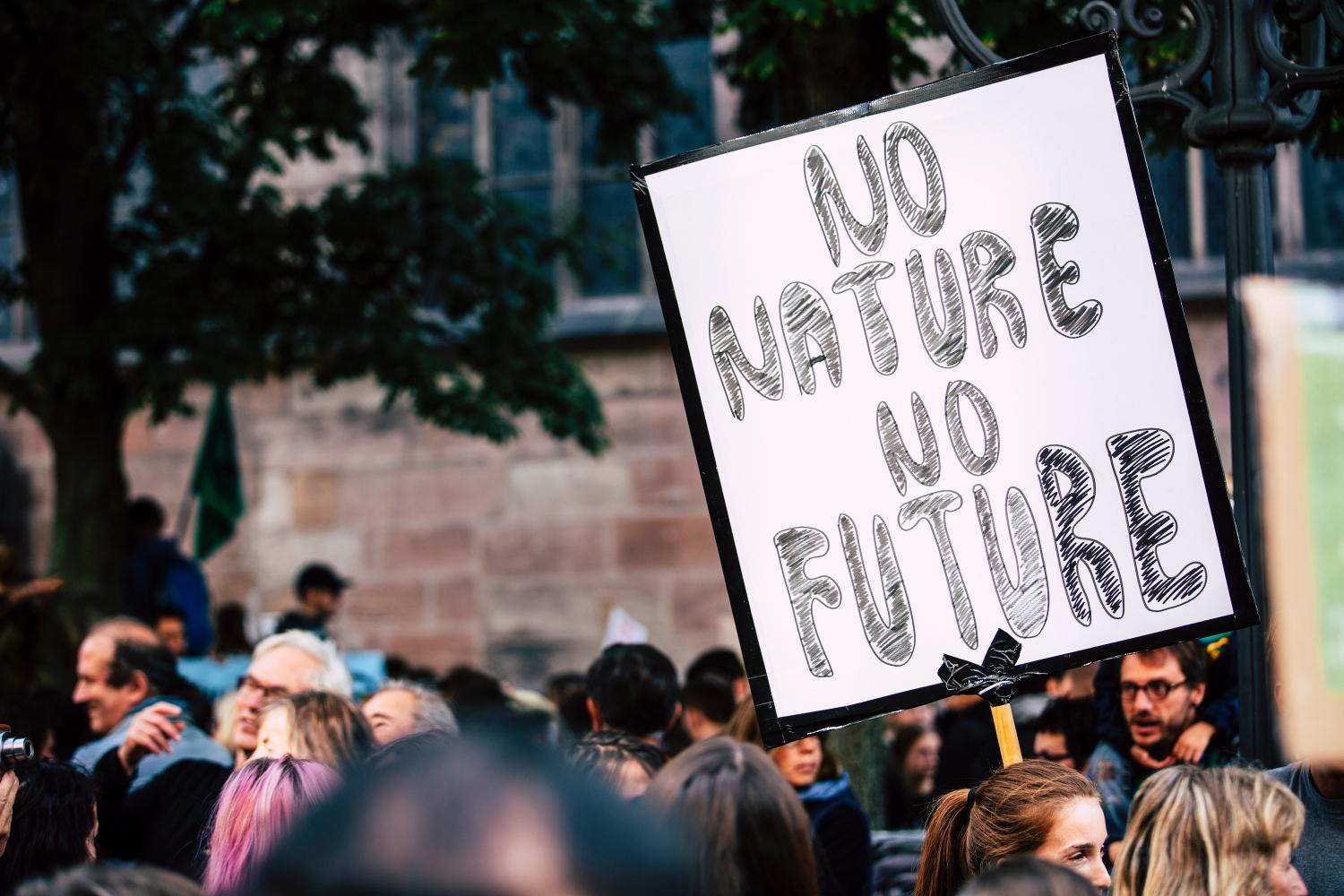
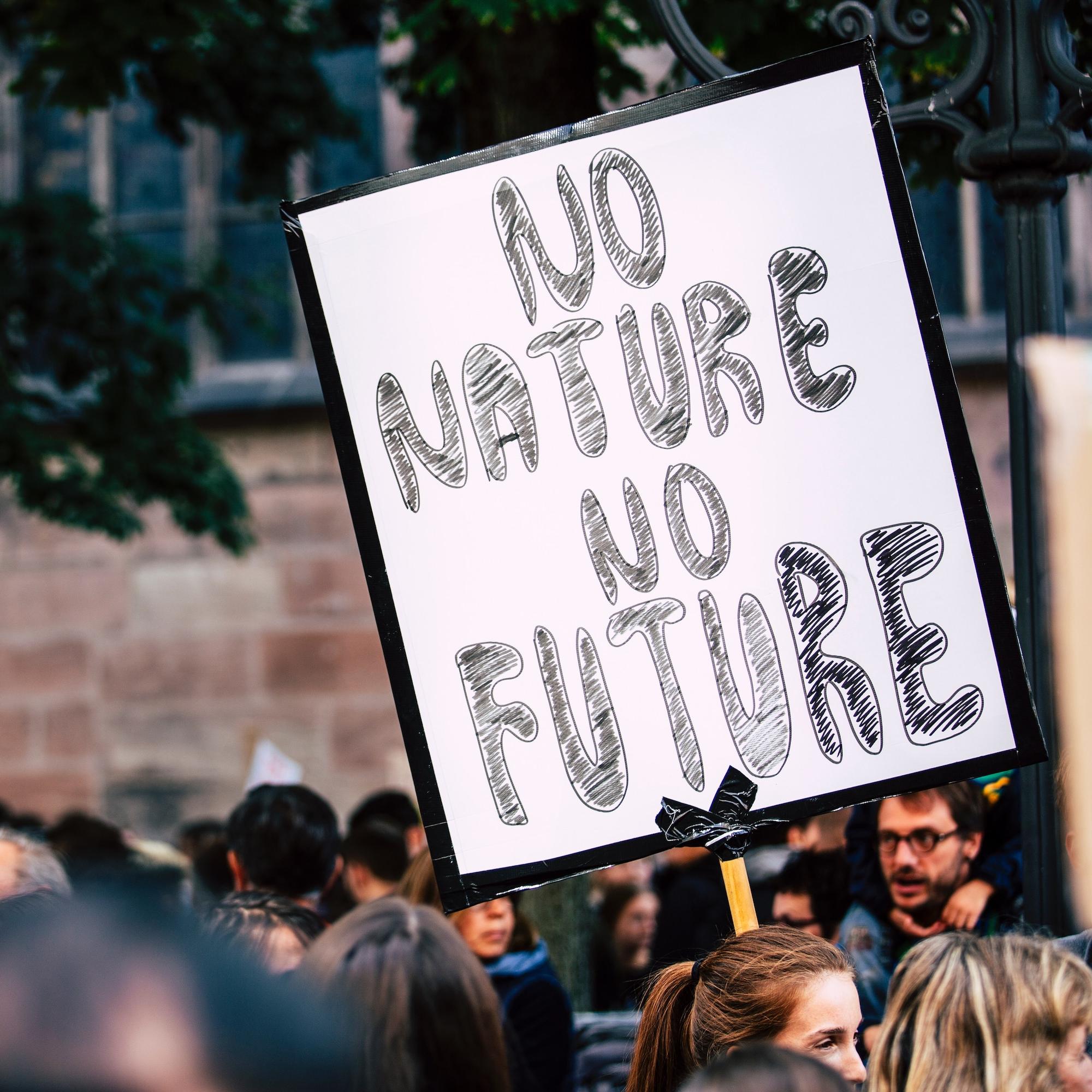
(Image: Protestors gather for a Global Climate Strike demonstration in September 2019.)
Social movements tied to climate change have been growing for some time. In 1999, more than 40,000 activists—including climate activists—took to the streets of Seattle, Washington, to protest a meeting of the World Trade Organization, voicing their support for workers' rights and sustainable economies in what became known as the Battle in Seattle.
Twenty years later, climate change social movements appear to have reached a critical mass. Various manifestations of these movements now engage a broad cross-section of society: NGOs, activist investors and investor networks are exerting pressure on companies to act on climate change through shareholder resolutions; students, academics, and other members of the public are now protesting and striking with regularity; and workers are walking out of companies they perceive to be climate change laggards.
In particular, Greta Thunberg’s Fridays for Future movement signifies the entry of new, younger and angrier generations into the climate change conversation. Thunberg’s speech to the United Nations Climate Action Summit exemplifies this movement’s anger and passion:
"My message is that we'll be watching you," Thunberg said at the U.N. on September 23. "People are suffering. People are dying. Entire ecosystems are collapsing. We are in the beginning of a mass extinction, and all you can talk about is money and fairy tales of eternal economic growth. How dare you! For more than 30 years, the science has been crystal clear. How dare you continue to look away and come here saying that you're doing enough, when the politics and solutions needed are still nowhere in sight . . . You are failing us. But the young people are starting to understand your betrayal. The eyes of all future generations are upon you. And if you choose to fail us, I say: We will never forgive you."
This message is unlikely to fade quickly, if at all. And it's already gaining traction within popular culture and the arts—from viral music remixes of Greta Thunberg’s U.N. speech to climate-focused art exhibitions at major events. Climate movements are also joining forces with other social and environmental movements. For example, the recent fires in the Amazon rainforest—and the contribution of cattle ranching to them—led climate change activists and animal rights activists to join forces in more substantial ways than before.
In short: Climate change social movements are now embedded in everyday life, and they are here to stay. Climate activists are not only students and nameless members of the public. They are our friends, our relatives, our neighbors and our co-workers. From a business standpoint, this means they are employees, customers, suppliers and investors.
Some businesses have grown to understand this and, in response, are changing their approach to climate change. Two such examples are Amazon’s recent pledge to fight climate change, after employees called the company out for lack of action, and similar pledges by gaming companies like Sony Interactive Entertainment and Microsoft.
However, businesses need to move beyond reacting to the pressure exerted by these movements to proactively answer questions like: What will tomorrow's climate activists ask of us, beyond what's happening now? What could happen when youth activists can vote, begin and progress through their careers, and have more purchasing power? And what should we do to align with these social movements over which we have no control?
Answers to these and other questions will have long-term implications for product development, marketing, talent acquisition and retention, operations, governance, and overall strategic direction.
Some businesses are already looking far into the future to consider how climate change might affect them, but are still focused on trends relating to technological development and the need to reduce carbon emissions, policy development, and adapting to physical changes like sea-level rise and temperature change. Companies would be wise to add the long-range impacts of climate change social movements to these trends, because they are an increasingly important part of the strategic landscape—and will be for years to come.
Companies need to build new visions of their future selves that account for what Greta Thunberg declared in her U.N. speech: “Change is coming whether you like it or not.”
Image credit: Markus Spiske/Unsplash
Etsy Makes the Case for C-Suite Buy-In Around Carbon Neutrality
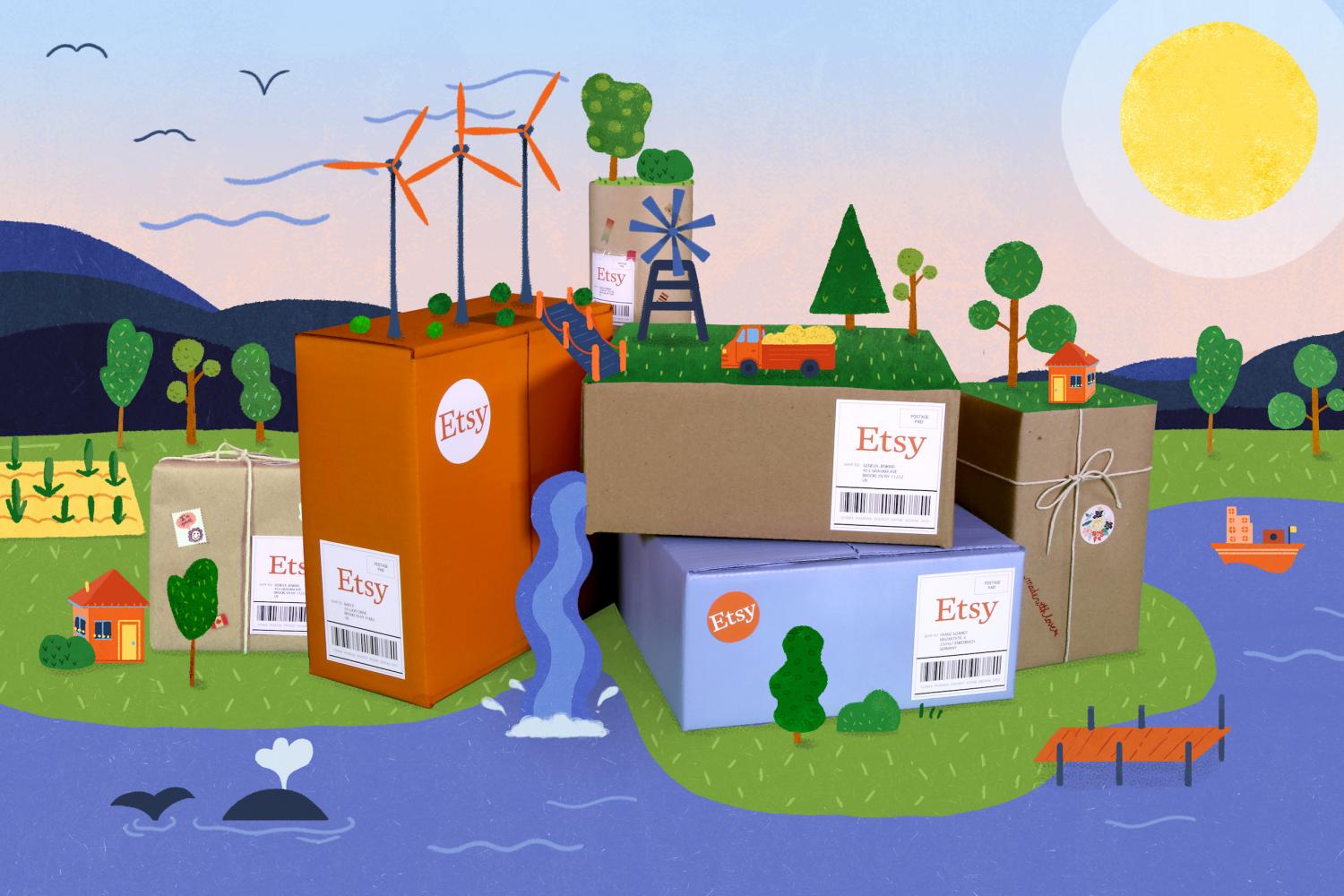
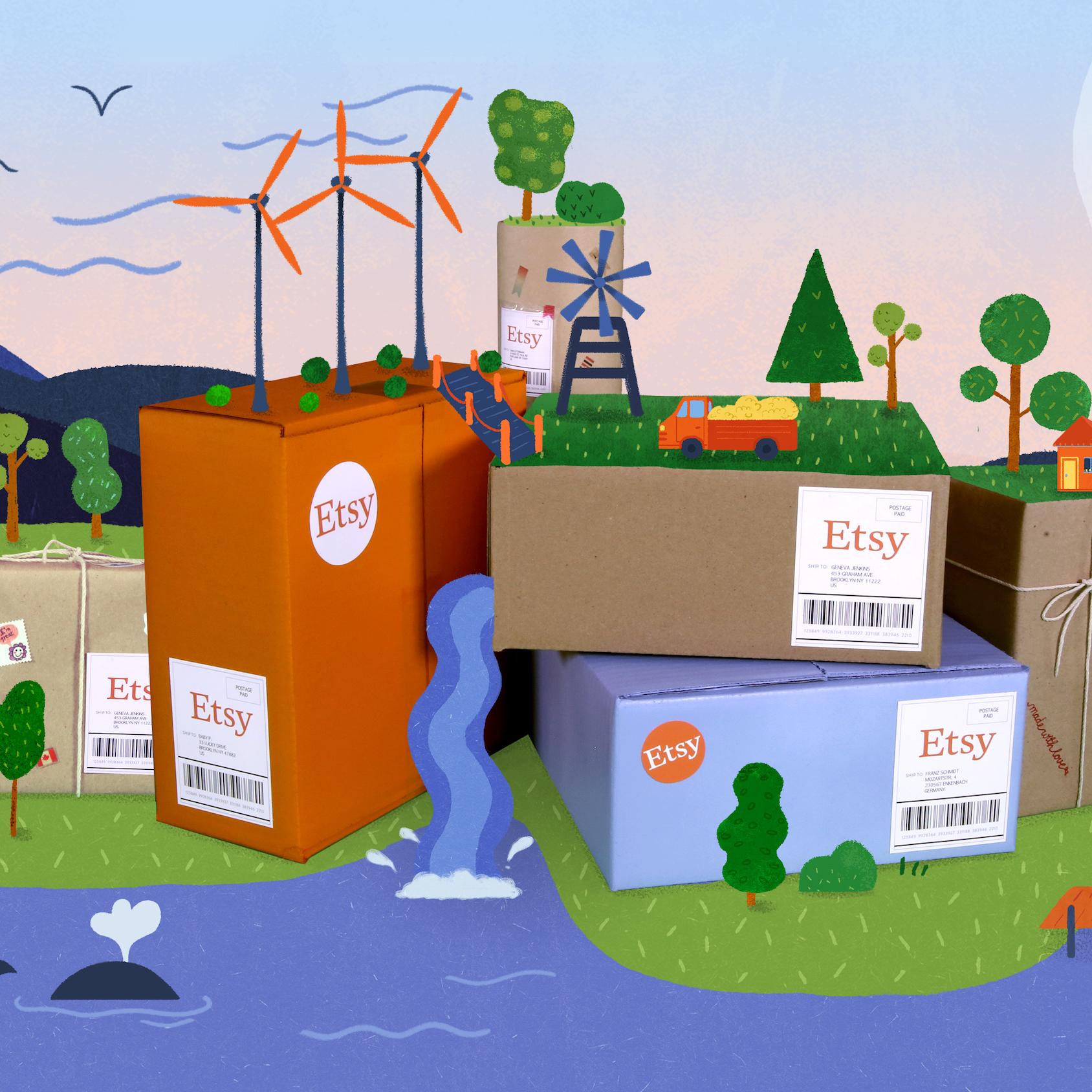
This article series is sponsored by 3Degrees and produced by the TriplePundit editorial team.
As the world’s largest logistics companies continue to incorporate electric and alternative fuel vehicles into their fleets, at first glance it may seem like technology is poised to propel shipping to carbon neutrality. But clean technology and zero-emissions vehicles are still many years away from transforming shipping as we know it.
Since the transportation sector is now the largest contributor to the United States’ overall greenhouse gas emissions, more urgency is needed while these technologies continue to scale. Some companies are taking the reins in their own hands to diminish the environmental impact resulting from transportation and shipping. Many are turning to carbon offsets, as an interim step, and winning over customers as a result.
Tackling shipping emissions in the e-commerce sector
E-commerce giant Etsy is one of those companies. For an online marketplace like Etsy, shipping is a crucial part of doing business. In fact, shipping and logistics account for 98 percent of Etsy's total carbon footprint.
Even though it doesn’t have direct control over the shipment of products sold on its marketplace—Etsy’s sellers ship directly to customers—the company decided to take action to address its carbon footprint and offset 100 percent of its carbon emissions from shipping earlier this year.
Etsy is the first major online shopping destination to offset all of its emissions from shipping, and customers won’t pay a penny for this perk. The move toward carbon-neutral shipping stems from a shared vision between Etsy’s sustainability department and C-suite leadership—and the results show that carbon neutrality does not have to break the bank.
C-Suite buy-in drives carbon neutrality at Etsy
Offsetting carbon emissions from shipping was Etsy’s next logical step in sustainability, Chelsea Mozen, Etsy’s sustainability lead, told TriplePundit. “We always knew the elephant in the room was our shipping footprint,” she says. “It’s been the key area of impact that we’ve needed to address after we got our operations in order.”
The company already achieved zero-waste operations two years ahead of its scheduled goal. It has also taken the necessary steps to be powered entirely by renewable electricity by 2020, part of which included securing a power purchase agreement that supports the development of two new wind and solar energy farms in Illinois and Virginia.
With support from CEO Josh Silverman, the online shopping destination teamed up with renewable energy and climate solutions partner 3Degrees to find offsetting solutions for shipping logistics, addressing that big elephant in the room.
Etsy considered two options: asking customers to pay for offsets at the point of sale, or covering the costs internally. Silverman agreed that the company should take full responsibility for its carbon footprint rather than requiring customers to opt-in.
“At the end of the day, we wanted to really say the full footprint was carbon neutral,” Mozen says. The company has offset its footprint from employee travel and commuting for years, so the sustainability team knew the cost wouldn’t be exorbitant. C-Suite leadership, however, was pleasantly surprised that investing in offsets to cover Etsy’s shipping footprint would cost less than a penny per package.
After doing his own research, Silverman started to understand the feasibility of addressing the company’s footprint. “In his mind, the question shifted from ‘Should we do this?’ to ‘Why didn’t we do this sooner?’” Mozen remembers. “It’s been wonderful having a CEO who is so invested and passionate about [sustainability] and so supportive of it.”
Shipping offsets pay off
If you’re wondering whether those pennies add up as packages ship across the country, you may be surprised to hear that the investment is actually helping, not hurting, the company’s bottom line.
When Etsy launched the initiative in February, it added a leaf logo in the checkout cart with information about carbon neutrality. Shoppers responded positively, and Etsy says it has seen a higher rate of conversions from the cart after advertising its commitment.
“The increase in conversion rate made this pay for itself,” Silverman told Jim Cramer of CNBC’s Mad Money. Mozen adds, “It really demonstrated that consumers are shopping their values and that they care about sustainability.”
And it appears to be paying off: In his appearance on Mad Money, Silverman referred to Etsy’s Q2 earnings as a “breakthrough quarter.” Gross merchandise sales grew by 21 percent, and revenue improved by 37 percent year-over-year.
It’s time to start thinking about Scope 3 emissions
As e-commerce companies proliferate and more people shop online while expecting one- or two-day shipping, or even same-day delivery, offsetting carbon emissions from shipping is more urgent than ever.
E-commerce sales rise steadily each year. Just last quarter, sales increased by 8.3 percent compared to the first quarter of 2019. Still, “companies aren’t accounting for [shipping] in their Scope 1 and Scope 2” emissions, Mozen says.
For most companies, including those in the e-commerce sector, greenhouse gases emitted during shipping are typically categorized as Scope 3 (supply chain) emissions, meaning they’re out of a company’s direct control. The vast majority of companies do not report on—or take steps to reduce—their Scope 3 emissions, and these emissions “haven’t been on the top” of many business leaders’ radar, Mozen explains.
But even for first-movers like Etsy, shipping offsets do not have to stand on their own—they can tie into other company objectives. For example, Etsy’s verified offsets tie into their goal “to build long-term resilience by eliminating our carbon impacts and fostering responsible resource use.” Offsets support bundled solar and wind projects in India, a forest conservation program in Minnesota, and an effort to reduce the impact of manufacturing lightweight auto parts, among other initiatives.
Yet when it comes to reducing the environmental impact of shipping, Mozen claims it can’t be done alone. “Etsy has a relatively small footprint for e-commerce compared to other companies. Us doing it alone isn’t going to solve the whole problem,” she says. “We claimed we were the first major global e-commerce company to offset our emissions from shipping, but we really hope that we’re not the last.”
Image and video courtesy of Etsy
Want to Be Known as a Responsible Company? Start with Trust


Sustainability reporting has evolved rapidly over the past decade. What was known a decade ago as “corporate social responsibility” as largely morphed into “sustainability,” or as many companies now prefer to say, “ESG” (environmental, social and governance).
But according to Toronto-based The Works Design Communications, which describes itself as an “integrated design studio and communications agency with a focus on sustainability,” what you call your report really doesn’t matter, at least according to the firm’s latest research.
A responsible company is a transparent company
What does matter is that your stakeholders can find, understand and use this data seamlessly. To their credit, more companies are framing this information so that investors can better understand it. That, in the end, is a win for people, planet and the equity markets.
Wesley Gee, Works Design’s director of sustainability, also noted those tasked with composing these reports are speaking the languages of many stakeholders. “More recently, I’ve noticed that a lot of reporting has started to offer smart functionality enabling companies to develop a better experience for multiple users at once,” he said during a recent interview with TriplePundit.
Gee acknowledges that the challenges that face sustainability reporting teams are daunting, especially considering the alphabet soup of various reporting standards, including CDP, GRI, the SDGs, TCFD and SASB – just to name a few.
Focus on your purpose, not checking the boxes
Less important than meeting all those checkboxes of standards, however, is getting across the company’s purpose, goals, success and struggles. “There is no one-size-fits-all approach because most analysts still don’t really know what they want,” Gee explained, “so we recommend that companies report on a combination of two or three frameworks. But when sharing the data, don’t forget the story. Context matters.”
Indeed, Gee noted that more companies are striving so set the context as they establish their purpose in making it clear to stakeholders that they do, indeed, have a forward-thinking agenda. And corporate reporting can help in this quest, along with tools such as social media, which can help companies rally support for their efforts as they make these stories authentic and relevant.
The results seem encouraging. Years ago, sustainability reports were mostly storytelling. Then, as stakeholders blanched at the public relations-heavy, glossy PDF reports, more of them became heavily data-driven, which often can distract from a company’s core story and purpose.
“Today we’re seeing, and supporting, a reporting approach that is more intentional. We’re working in a more coordinated way with corporate communications, investor relations, human resources and sustainability leads to plan and deliver a complete solution,” said Gee. “We believe that good reporting acknowledges expectations and executes on a plan that is far more customized. The formats we choose, those who we engage with and the analytics we assemble enable us to be nimbler and more objective. It helps us all have a little more fun to thoughtfully and objectively adapt to this changing space.”
Transparency + accountability = trust
But the bottom line for companies is that once the formats, details and tone of reporting are sorted out, the real objective for companies should be to build trust.
You can’t sow trust if you’re not authentic. And you can’t be authentic if you don’t show your vulnerabilities. So what’s the answer, then?
Being upfront would be a start.
According to Works Design’s research, only one-fifth of companies included case studies that were related to a negative event.
“The fact that only 20 percent of companies will discuss or disclose a negative event is really surprising,” said Gee. “After all, we’re all grown-ups here and we know how to relate to other human beings, so let’s show our challenges, threats and risks – don’t just beat your chest; no one wants to read that.”
Gee nails it when it comes to is comments about trust and “beating your chest.” It was a reminder of earlier this year when one public relations rep contacted 3p’s staff about a client in the financial services sector that recently issued a sustainability report. And the key point of this report was that the company, unlike other high-profile companies within and beyond the financial sector, had not suffered a data breach over the previous year and were proud of it. My response, written but never sent, was, “Wait, they are proud they didn’t have a data breach? But isn’t data protection part of their job?”
Look to Down Under for a great example of building trust
One example Gee held up as an example of a company that does as much as possible to build that trust, and is doing so with authenticity, is Westpac Banking Corporation, based in Sydney, Australia. (We should add Gee made it clear this company is not a client of Works Design).
The title of Westpac’s latest sustainability report makes it clear: “Strength. Service. Trust?” And that final word, along with the question mark, is colored in bold red. “They had undergone challenges, including data security,” Gee said. “And this report is a way for them to explain how they are working to do what they can to gain, earn and keep that trust.”
That’s a pretty bold chance Westpac is taking to admit it has struggled with trust. But there you have it, on page 109 – the bank had received over 600 substantiated complaints related to breaches of customer privacy or loss of data.
This frank approach to sustainability communications may rattle many communications professionals, but to reiterate what Gee said during his talks with 3p, trust and accountability matter. There’s no sense in trying to overlook it or sweep it under the rug – as it will come out eventually.
A reminder: We're pleased to offer 3p readers a 25 percent discount on attending the Forum. Please register by visiting the 3BL Forum website and use this discount code when prompted: NEWS2019BRANDS.
Image credit William Iven/Unsplash
ESG Regulations Swim Against the Tide in the U.S., But the Fight Is Worthwhile
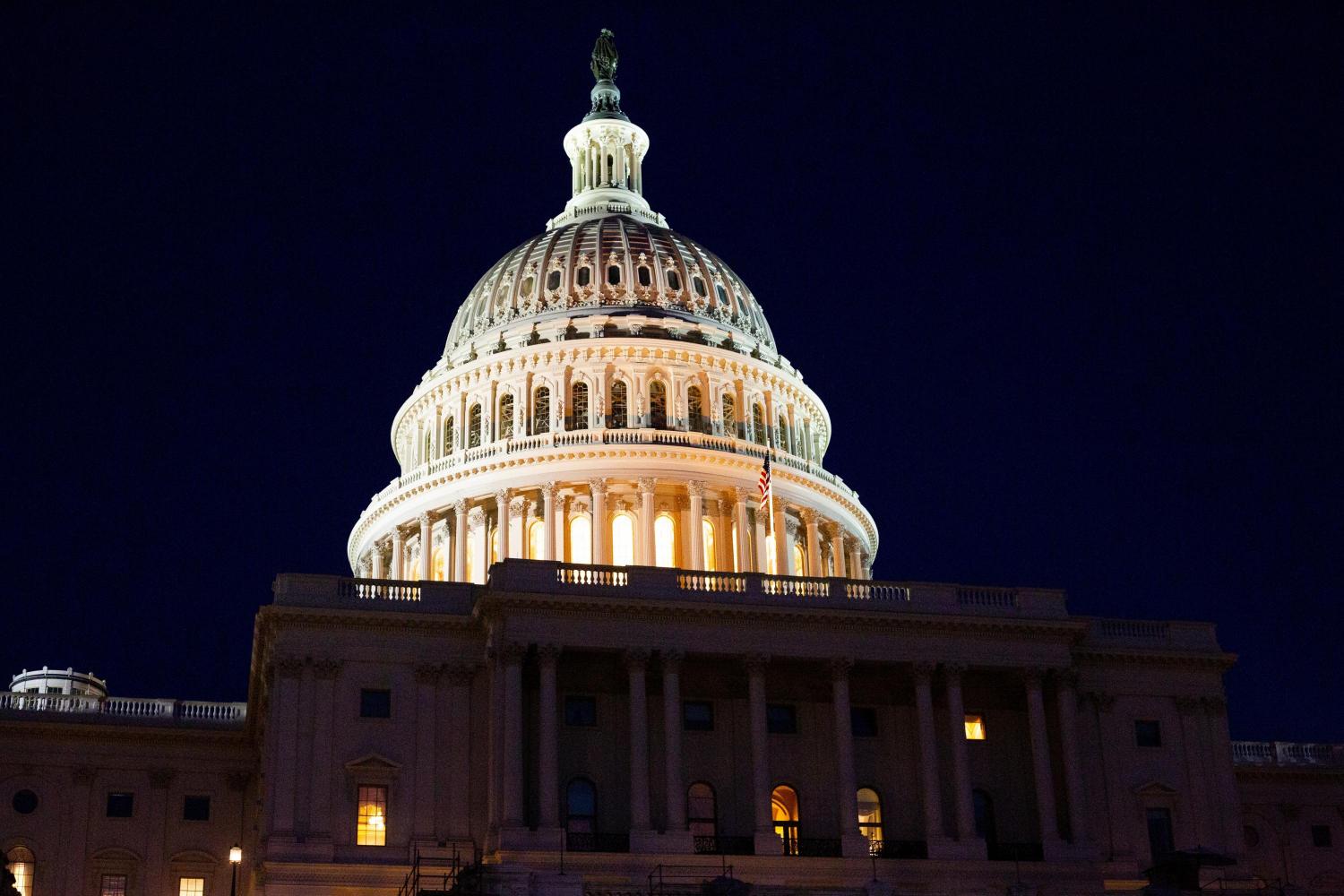
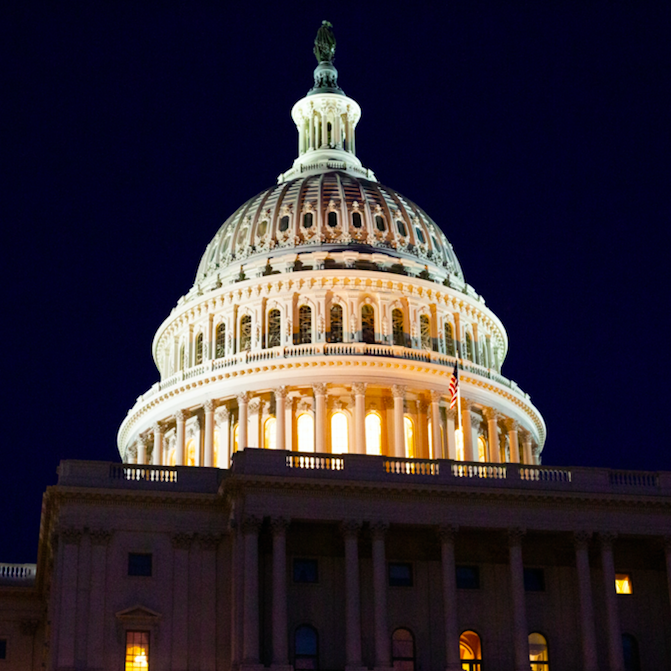
There’s been a great deal of skepticism about the ESG (environmental, social and governance) disclosure regulations being put through U.S. Congress in recent months. Republican control of the Senate and the Donald Trump administration’s tendency toward deregulation, particularly in relation to environmental rules that could curtail the activities of the fossil fuel industry, make it hard for anything related to ESG regulations to gain any traction.
The latest development was the Sept. 27 passing of the ESG Disclosure Simplification Act (during Climate Week, fittingly enough) which mandates the definition of ESG metrics by the Securities and Exchange Commission and makes these metrics far more seamless to audit. But why, despite all the political challenges, should this act become law?
Building momentum for ESG regulations
The value of the legislation is not in changing the world in a single, all-powerful legislative swoop; it’s in building momentum. The first big step was seeing these topics discussed in Congress back in July. The passing of the Simplification Act represents another stride forward on ESG disclosure and a real opportunity for the U.S. to lead the way.
Though progress is slow, the movement seems to be inexorably toward mandatory reporting. Chris Burkett, a partner at multinational law firm Baker McKenzie, says: "Under the current state of political affairs in the U.S., I think it's highly unlikely that this will become law in the near term. However, it is certainly a sign of progress that this is on the Congressional agenda. In my view, it is only a matter of time until ESG reporting is mandatory—the trend is clear and investors will ultimately demand it.”
Speaking at a recent conference held by the Task Force on Climate-related Financial Disclosures (TCFD) in Tokyo, Mark Carney, governor of the Bank of England, observed a growing appetite among investors to support companies that understand their climate risks, following research that showed these companies are likely to expand at a faster rate.
Building the business case
There’s a huge value in laws that focus on specific challenges—like climate change, for example—which umbrella terms like 'ESG’ or ‘sustainability’ simply do not capture. It’s a sad fact of life that businesses will recognize the significance of a particular issue only when it bites away at their bottom line. A specific risk is far more tangible, and its financial implications are clear to business leaders. This is why the TCFD has been so successful in gaining traction. Focusing on a single issue that’s framed as a clearly defined business risk generates a sense of urgency among CEOs.
It is only by discussing environmental issues in the public eye that we can pluck them from the back of executives' minds and bring them to the forefront of corporate thinking. That’s why it’s important for us to see these issues being spoken about in Congress, on the news and in social media. More importantly, policymakers actually went through the effort of putting the Act in writing, for it to be either enacted or built upon.
Building pressure
Passing this legislation is another step toward consistency. Elsewhere, things are happening. The United Kingdom has obliged all listed companies and large asset owners to report on climate-related risks and opportunities in line with the TCFD recommendations by 2022. Relating only to climate change rather than to wider ESG issues, the TCFD gives companies a clear focus for their activities. From what our community is saying, European investors are putting pressure on U.S. companies to align their strategy with the Paris climate agreement. Perhaps as other nations introduce laws that encourage greater environmental awareness, the pressure on the U.S. to do the same will also increase.
Carney said companies should use their next two annual financial reports to test how they document the impact of the climate emergency on their businesses. “The TCFD needs to reach a definitive view of what counts as a high-quality disclosure before they become mandatory,” he said. “In my view the next two reporting periods should balance the urgency of the task and the imperative of getting it right.” Once we derive best practice, we can then go about making it law.
We’re a long way off, but act by act, discussion by discussion, bit by bit, ESG issues are clawing their way into the public consciousness. The ESG Disclosure Simplification Act is another such example. Maybe the act in itself won’t bring about the wholesale change needed, but it’s another step forward. Another blow struck in the fight. In the same way that the reality of global climate change will not go away by itself, demand for disclosure is very much here to stay.
Image credit: Darren Halstead/Unsplash
This Family-Owned Company is Striving to Be a Hallmark of Transparency
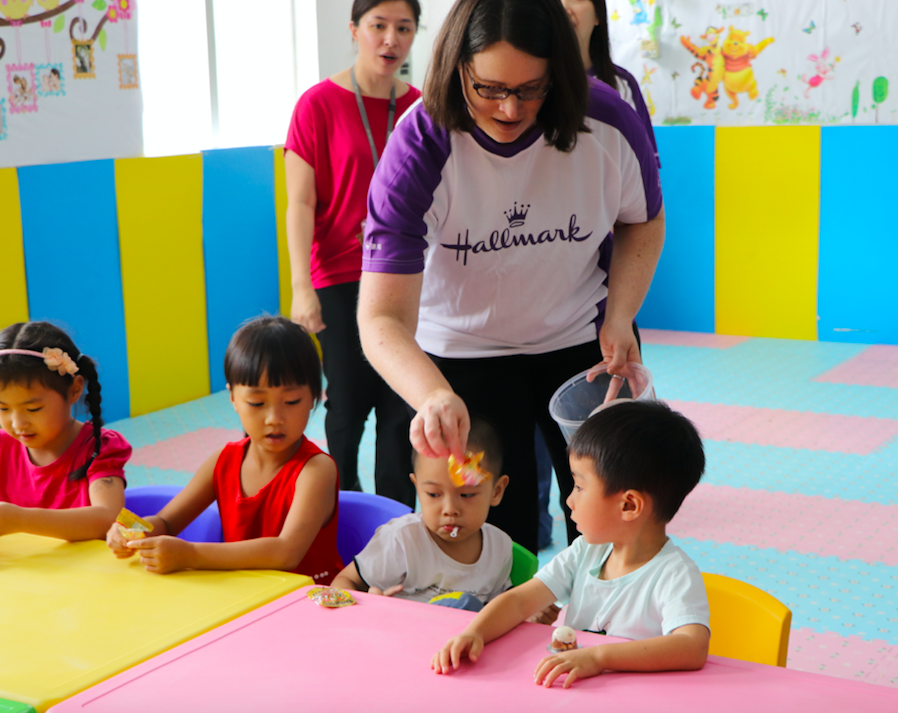
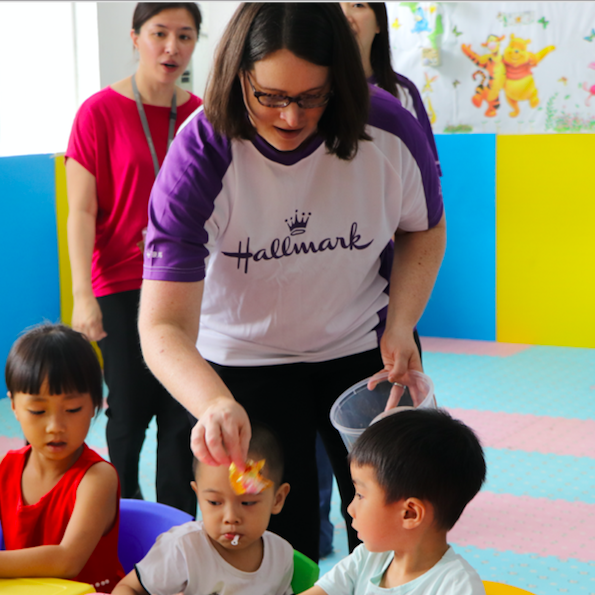
When we talk about responsible, sustainable or transparent companies (or all of the above), most of the focus is on publicly traded companies. Our annual list of the 100 Best Corporate Citizens, for example, only includes publicly owned corporations, as quite simply, the data needed to evaluate them is readily available. These companies have little choice to share their financials and material risks, due largely to U.S. securities laws on this side of the pond. While privately owned corporations don’t have that legal requirement to share financial and non-financial information at the same level of disclosure, in this day and age, it certainly behooves them to do so for many reasons. To that end, such companies may want to take a look at the actions Kansas City-based Hallmark has been taking.
The company, known of course for its greeting cards and eponymous channel on cable television, has launched a robust corporate citizenship program in recent years.
One’s gut reaction to Hallmark and its corporate citizenship program could be: We’re talking about greeting cards and Christmas ornaments here. What kind of impact could it possibly have? Well, all those retail stores, paper and materials needed for those Crayola crayons and colored pencils, which together comprise a $4 billion company, do have an impact. Energy and power are consumed; factory workers are subjected to risks on the shop floor; and today’s fickle workforce needs that healthy dose of inspiration once in a while.
Hence, we now know more about what goes on Hallmark behind the scenes. At the same time, the company’s approach toward corporate sustainability is driven by the goodwill it has long had towards the Kansas City community.
“Like many companies, we’ve seen the need by our customers and consumers to have greater insight into what causes and initiatives we support outside of a product line,” said Andy DiOrio, the company’s public relations and social media director. “What difference are we making in our communities? How are we caring for the workers that make our product both domestically and abroad? How are we being mindful of any waste, water or other materials as part of the sourcing or end-user impact?”
The bottom line for Hallmark is that these are all questions from the company’s stakeholders that have taken on a sharper focus in recent years, and according to DiOrio, the company is determined to join them in ensuring it can create and maintain a sustainable impact across its operations and supply chain.
Part of maintaining that impact is ensuring its employees are engaged and suppliers. Just take a look at its core business: Greeting cards. Composing a greeting card is like composing a Piet Mondrian painting – just try it, and see how the results pan out. There's no crowdsourcing this creative material - Hallmark hires employees to do that.
“At its core, Hallmark is a creative company with one of the world’s largest creative workforces, topping more than 1,000 professionals across the globe,” noted DiOrio. “Creativity is at the core of what we do, and the lifeblood of our company. Not only is this reflected in the products or entertainment we produce, but it can also translate into creative ways we create solutions on better ways to manufacture these products, source the materials and contribute toward important causes in our communities.”
That deep reverence for creative work guides Hallmark’s community engagement programs. Various initiatives include giving employees within the company’s “creative community” (including those who write and design products) five paid days a year to take a break from their daily roles and explore projects that can help keep those passions ignited. Last year, the company decided to expand this program so local community organizations could benefit from such volunteerism. In addition, Hallmark has supported a community theater program in downtown Kansas City for 40 years; across the U.S., its Crayola division runs a grant program that offers schools support to bolster art education curricula.
These programs didn’t occur in a vacuum – much of this community-focused work dates back to the company’s earliest days over a century ago. The Hall family, which still owns the company, has been mindful of the role it can play in the Kansas City region, and nowadays, its overseas suppliers.
Hallmark’s owners have long had an affinity for its home base of Kansas City. During the winter of 1915, the young company came off a successful Christmas season and was planning for the upcoming Valentine’s Day rush, only to lose its entire inventory in a disastrous early morning fire. The community rallied around the young company; supporters included a piano company owner who offered some of its unused office space free of charge.
It today’s political and social climate where you’ve got to be on one side or the other, Hallmark benefits from the fact that it has a product portfolio that can bring people together – no one (level-headed) ever got livid from getting a 64-pack of crayons as a gift or a card in the mail.
Nevertheless, you count on the fact Hallmark will keep the lines of communications open when it comes to it challenges. The company is currently formulating its goals for 2030, while the moment of truth for its 2020 objectives is coming along fairly quickly.
“Hallmark has and continues to play a unique role, especially in todays’ society. We are a company about caring and fostering emotional connections between you and the ones you love,” DiOrio explained. “During a time where it feels very divisive and you must be on one side of an issue or the complete opposite, Hallmark and its business are about bringing people together, celebrating our commonalities, and fostering a sense of togetherness; something needed perhaps now more than ever.”
A reminder: Hallmark is one of several legacy companies onstage during the Forum. We're pleased to offer 3p readers a 25 percent discount on attending this two-day event. Please register by visiting the 3BL Forum website and use this discount code when prompted: NEWS2019BRANDS.
Image credit: Hallmark
Consumers Strive for Sustainable Living, and Companies Can Help
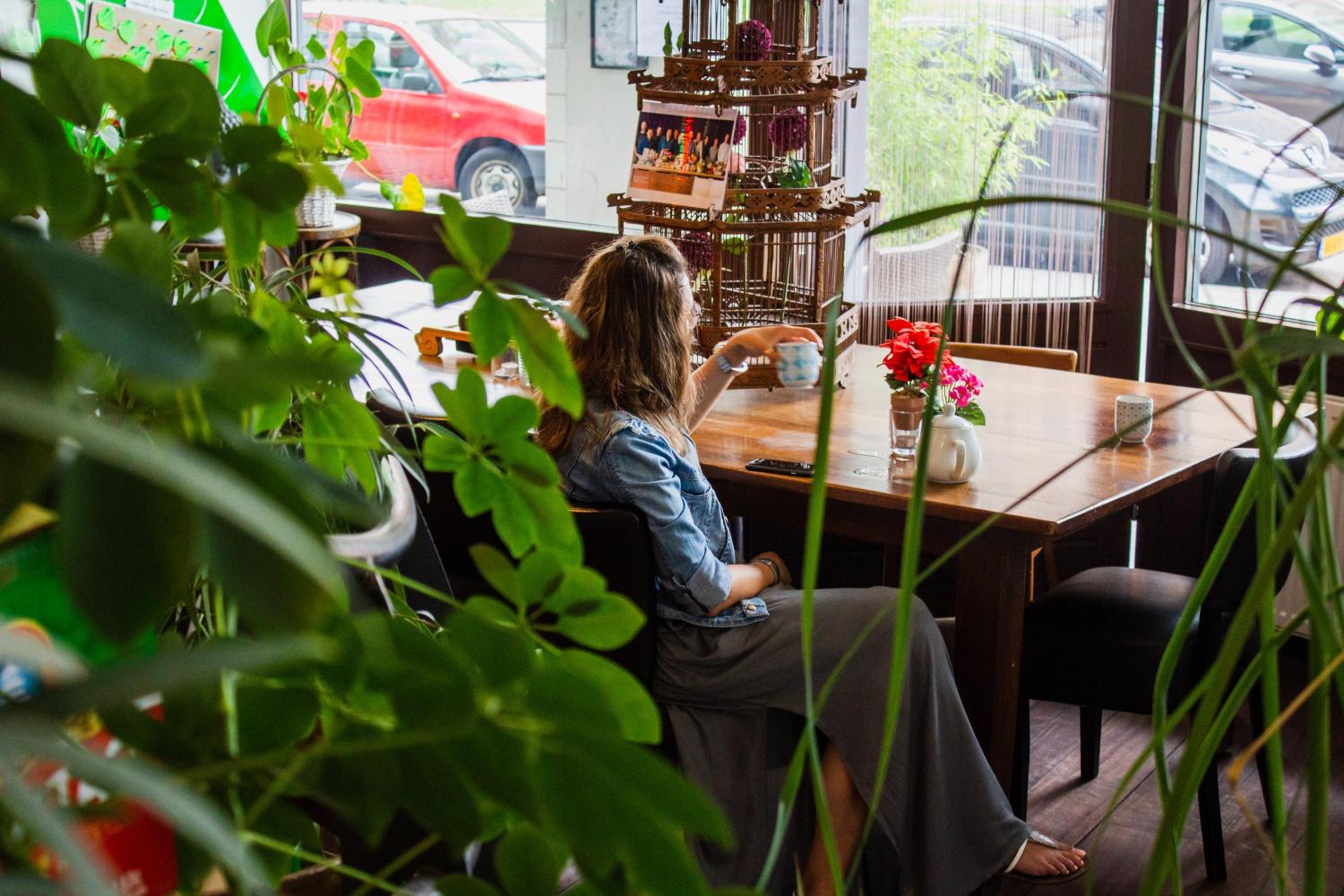
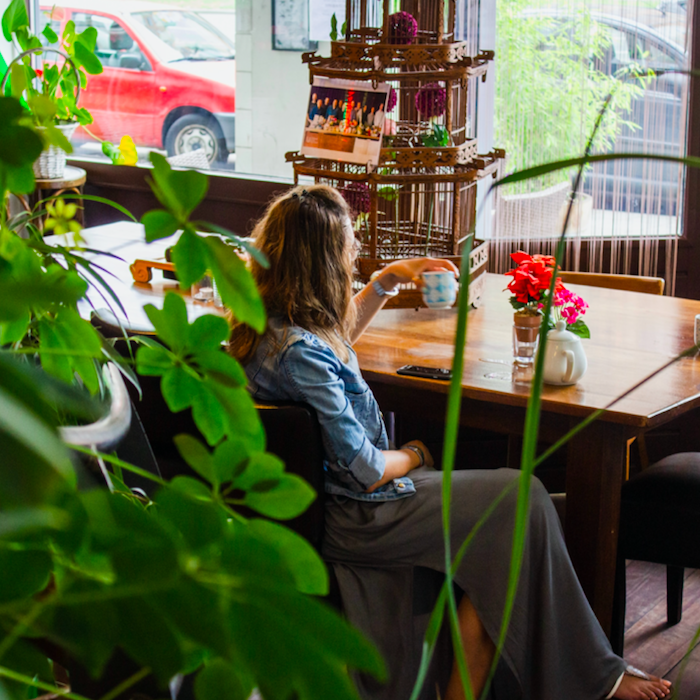
A report released by the strategy consulting firm GlobeScan indicates that "eco guilt"—anxiety around what one should and could be doing for the planet—lives on.
The report found that while 54 percent of people across 25 countries say that living in a way that is good for themselves, others, and the environment is a "large" or "major" priority for them, only 37 percent say they "mostly" live this way now, according to the survey. The countries with the highest percentage of citizens who view climate change as a "very serious" problem are Mexico and the Philippines. The countries with the lowest percentage of respondents who view it as a problem are Russia and China—the first and fifth largest emitters of carbon worldwide.
In the report, younger generations—Generation Z and millennials—expressed the most significant interest in living healthier and more sustainably while also polling the most concern about not living consciously enough.
The report is an outcome of a partnership among GlobeScan, Ikea, VF Corporation, WWF International, Procter & Gamble and Visa to better understand consumer behavior regarding sustainable living.
"We want to use the insights from this and other studies to enable many people to live more sustainable lives, and at the same time contribute to societal change through innovations and new collaborations," Lena Pripp-Kovac, head of sustainability at Inter Ikea Group, said in a public statement. "Our ambition is to make sustainable living affordable, attractive, and accessible for the many people with thin wallets."
Barriers get in the way of sustainable living
The report indicates that many citizens worldwide, across different cultures, want to do better when it comes to shopping ethically and sustainably. But barriers to such action—including affordability, not enough government or business support, and not understanding how to live a more sustainable lifestyle—are not being addressed to allow for faster adoption.
The No. 1 barrier, high price, is a reminder that even though 90 percent of U.S. millennials are willing to pay more for products beneficial for the environment, a premium pricing strategy may not go mainstream globally.
"I would like to eat organic foods and local products/services more because I believe that will be very good for our environment, health and economy," one participant, a female with two children who lives in South Africa, responded in the report. "What limits me is money."
Companies should incentivize healthier and more sustainable lifestyles
An interesting take-away from the report are the findings around the subconscious and conscious drivers that contribute to individuals' sense of living a healthy and sustainable life. Significant factors—healthful food, shopping ethically and avoiding packaging and plastics—require companies to reward behavior or to develop creative business strategies to decrease consumers' feelings of eco-guilt.
The first method to empower the consumer is to reward their good behavior. Companies should encourage consumers' healthy and sustainable actions that they perform frequently through incentives and rewards programs—think eating locally produced food or buying a socially responsible product, according to the report.
One example is Amazon Day—an option that allows the world’s largest online retailer’s customers to choose one day a week for non-urgent items to be delivered. In exchange for accepting the less carbon-intensive shipping option, Amazon offers digital credits for future purchases, as explained in Forbes.
The second strategy is for companies to enable consumers to live healthier lifestyles by rethinking their procurement practices and supply chains to empower eco-minded customers. Loop—a global circular shipping platform—is an excellent example of enabling customers to act on their eco-guilt with a profitable solution.
Or, take Scandinavia Airlines' biofuel program that enables eco-conscious customers to purchase biofuel at any time up until departure for 20-minute blocks of a flight time, according to Fast Company. Such an initiative puts the power back into the hands of the consumer to act on their eco-guilt and take steps towards traveling sustainably.
"Consumers want to make positive changes in their lives but they need help from businesses and governments," Cristianne Close, Markets Lead at WWF said in a public statement. "This research shows there's a huge opportunity to shift markets and economies toward supporting a better future for people and nature."
Image credit: Louis Hansel/Unsplash
HP: Printing Can be More Sustainable Than You Think
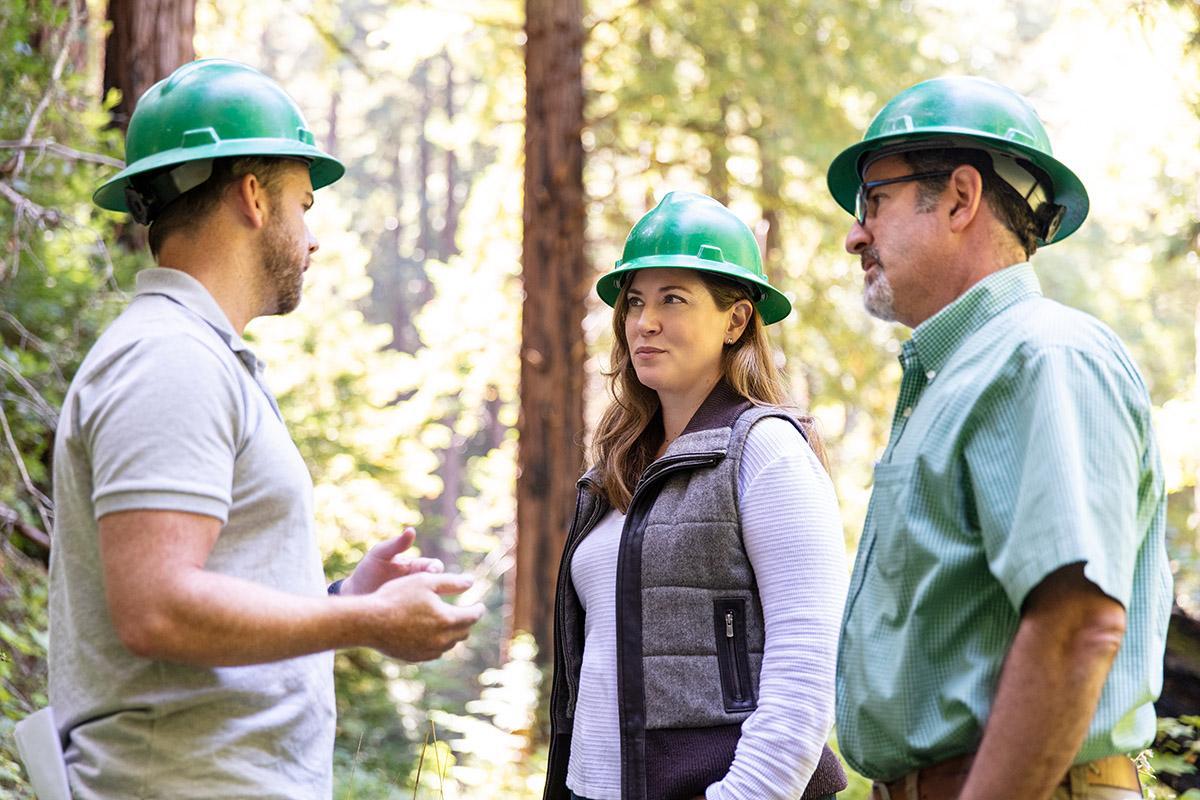
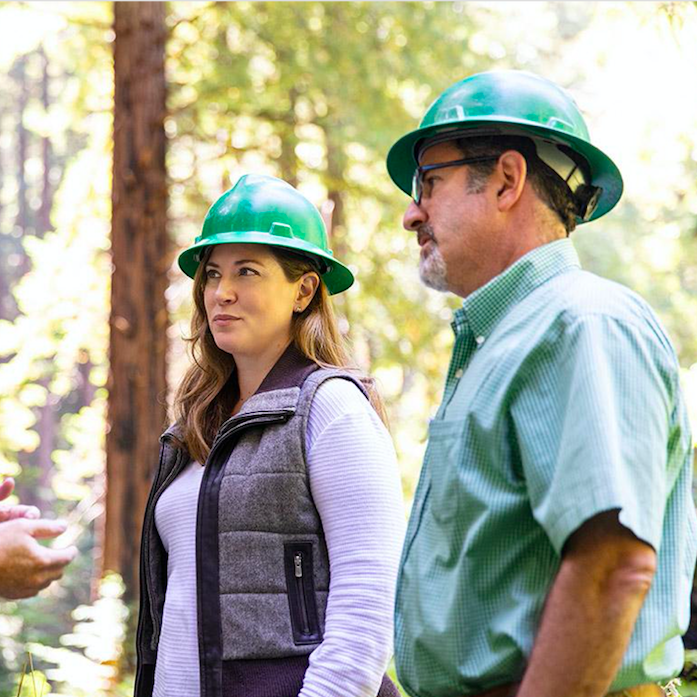
Ellen Jackowski, global head of sustainability strategy and innovation at HP, recently visited an FSC-certified forest to see responsible forest management in action.
Everyone has seen the messages on the wall near the office printer or at the end of an email: "Think before you print," "Please consider the environment before printing," or "Save paper, save a tree." These messages spring from the conventional wisdom that using paper requires trees, so avoiding printing must be the more environmentally friendly choice.
But what if printing could actually help protect and grow forests?
While deforestation is still occurring in some places around the world for paper production, companies that source or make paper can actually benefit the world’s forests, thanks to new developments in forestry practices and corporate commitments to conservation. When people buy paper and paper products that are sourced from well-managed forests, their purchases can protect forests instead of depleting them.
“As human beings, even if we do everything we can to reduce our consumption, we are still impacting the Earth’s natural environment,” says Ellen Jackowski, global head of sustainability strategy and innovation at HP. “We will always need to consume, but we must innovate to consume responsibly in harmony with our planet.”
HP currently makes all of its paper with fibers from sources that don't contribute to deforestation; the majority of HP paper around the world is certified to Forest Stewardship Council (FSC) standards, the gold standard in forest management that protects people and nature. That decision is part of a much bigger vision — a forest positive future, in which companies that source raw material from forests account for their impact by not only contributing to forest health today, but helping to preserve forests for the future.
Recently, HP has announced it is taking a huge leap forward to this future with longstanding partner and conservation leader World Wildlife Fund (WWF). Over the next five years, HP will contribute $11 million for WWF to restore part of Brazil's threatened Atlantic Forest and increase sustainable management of state-owned farms and forest plantations in China – ultimately protecting a combined area of 200,000 acres. HP’s partnership with WWF will support the development of science-based targets for forests, estimating carbon and nature co-benefits of forest restoration and improved forest management. The new initiative with WWF begins in November and marks the launch of HP’s Sustainable Forests Cooperative.
All HP-branded paper is already deforestation-free, and by 2020, the company is on track to achieve 100% zero-deforestation for all of its paper-based product packaging. These efforts and the partnership with WWF are supported by FSC and International Paper, one of the world’s largest paper manufacturers. The ultimate goal is to make printing with HP a catalyst for industry-wide support for FSC-certified and recycled fiber sourcing, while contributing to the restoration, protection, and improved management of the world’s forests.
Managing a healthy forest
Forests are essential to life on Earth. They provide homes for thousands of species. They produce oxygen, store carbon, and regulate global climate. And they support millions of people who depend on them for survival.
But along with clear-cutting for agriculture, demand for timber has fueled high rates of deforestation, threatening nearly half of the world’s forests. According to WWF, the planet is losing 18.7 million acres of forest each year — the equivalent of 27 soccer fields per minute. Recent fires in the Amazon rainforest and Indonesia and Africa have shown how the rate of deforestation has reached critical levels. Much of this is due to the fact that people cut the forest down to earn a living from things like soy or palm oil or beef. To counter this cycle, local communities need new ways to develop economically. By committing to purchasing FSC-certified fiber, HP is working to create incentives to keep forests intact and prevent deforestation.
Finding the balance of using and maintaining this precious resource that we can’t live without is crucial. On a recent visit to an FSC-certified forest near HP headquarters in northern California, HP’s Jackowski walked through a mix of young and old-growth redwoods. She saw streams where salmon swam, while birds chirped overhead. While this forest produces timber harvested for lumber, the visit gave a glimpse of what a sustainably managed forest can feel like.
“This is how the planet runs naturally and this is how we need to continue to protect it for future generations,” Jackowski says. “You can't eliminate certain aspects of a healthy forest and still expect it to maintain itself like it might have otherwise.”
Conventional forestry practices involve heavy harvesting and pesticide use. When chemicals are used, they can come into contact with freshwater bodies or local communities. But in an FSC-certified forest, trees are cut selectively and chemical use is highly restricted. Standards also cover the physical health, and social and economic well-being of people who work in FSC-certified forests.
“If you're walking in a conventionally managed forest, you're seeing very large openings and is a highly altered landscape,” says Corey Brinkema, president of FSC’s US national office. “Walking in an FSC-certified forest feels like you're walking in a natural forest. You tend to have the qualities that you would expect if you're walking through your state park.”
Conservation through collaboration
With the HP Sustainable Forests Cooperative, HP is taking steps to make printing with any paper more sustainable — not just its own. The new initiative is designed to conserve an area of forests and increase the supply of FSC fiber, enough to cover the amount of paper (even non-HP branded paper) that runs through HP printers, according to calculations by HP and WWF.
The initiative covers two forest conservation programs. One is a restoration project in Brazil’s Atlantic Forest, a biodiversity hotspot that’s home to jaguars, hundreds of tree species, and 5% of the Earth’s vertebrate species — many found nowhere else on Earth. The other will increase the area of responsibly managed forest in China, which produces and consumes more paper than any other country.
“HP wants to lead the way to help reduce negative impacts of printing with HP, and help educate consumers around sustainable paper choices that keep forests healthy," says Jackowski.
Every package of HP paper is sustainably sourced, carrying an FSC label, as have a number of products from companies that Brinkema says have followed HP’s lead. He says these commitments have been critical in creating demand for sustainably sourced paper, and that momentum has helped the network of certified forests grow.
FSC-certified forests must meet a strict set of standards, protecting biodiversity, wildlife, and the rights of indigenous and local communities through management methods that also consider soil, waterways, and vegetation. “Consumers can use their purchasing power to reward companies showing leadership for forests and nature,” says Linda Walker, senior director of corporate engagement for World Wildlife Fund. Looking for an FSC label “is the one simple action that people can take to know that they are helping forests with their purchasing decisions.”
For WWF, the new collaboration with HP is an opportunity to accelerate forest conservation in ways that can enhance existing efforts and influence other companies to step up, says Walker. In Brazil, for example, HP’s investment is adding to commitments by other companies, including supply-chain partner International Paper. International Paper manufactures HP-branded paper and produces seven million tons of responsibly sourced fiber for paper products each year.
This shared commitment is part of the forest positive concept, Walker says, ultimately strengthening forest health far into the future.
“You can have more of a likelihood of a resilient, connected landscape over time, versus more piecemeal conservation actions,” she says. “We believe this will have a lasting impact on forests and have a ripple effect on other companies that need to scale up their actions for forests. Every business is in the forest business, because every business depends either directly or indirectly on forests. For businesses to thrive in the future, nature needs to thrive.”
Image courtesy of HP
Previously published on HP's Garage Blog and the 3BL Media newsroom.
International Day of the Girl Partnership Aims to Empower 10 Million Students and Teachers
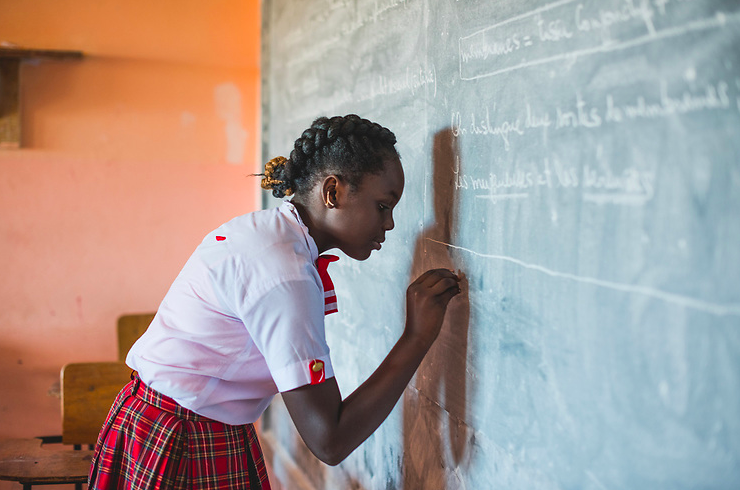
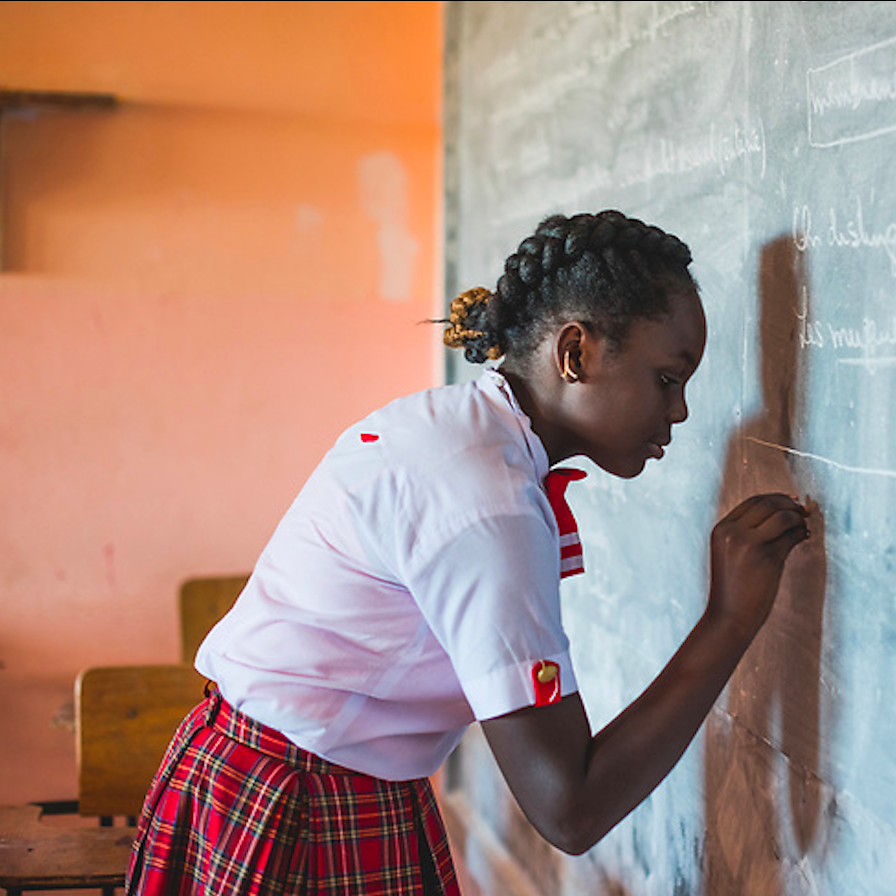
Today marks the eight annual International Day of the Girl, a day established by the United Nations to amplify girls’ voices and stand up for their rights as envisioned in the Beijing Declaration and Platform for Action, the most progressive blueprint ever for advancing women’s rights.
The Platform for Action, which will mark 25 years next year, envisioned gender equality in all dimensions of life, something that no country has yet achieved, according to the U.N.. Nowhere is this truer, say women’s rights advocates, than in education.
According to New York-based Women Deliver, only 45 percent of developing countries have achieved gender parity at the lower secondary education level (seventh through ninth grades) and only 25 percent have done so at the upper secondary level (10th through 12th grades). This adds up to more than 130 million girls around the world who lack access to education.
To mark today’s International Day of the Girl, HP and the nonprofit Girl Rising—best known for its award-winning documentary of the same name—announced a new initiative leveraging the tech giant’s technology solutions for schools and Girl Rising’s youth empowerment curriculum.
The initiative seeks to reach up to 10 million students and teachers in the United States, India and Nigeria, helping to raise awareness of the value of investing in girls and helping HP meet its goal of enabling better learning outcomes for 100 million people by 2025.
“HP believes that education is a fundamental human right that creates pathways to new opportunities,” said Michele Malejki, global head of HP’s social impact programs. “Data also show that education is one of the single most effective ways to eradicate poverty and a critical building block for nations’ economic growth and development.”
New digital resources for teachers and students
The new initiative will add Girl Rising’s teacher training modules to HP’s Education Edition PCs. Targeted toward primary and secondary schools, HP will also deploy a suite of curricula and a library of content to accompany the HP School Pack, a suite of software pre-loaded onto HP’s EHP Education Edition PC.
In addition, with the goal to develop the next generation of female leaders, the HP Learning Initiative for Entrepreneurship (HP LIFE), a free e-learning program from the HP Foundation created to support entrepreneurship and skills development, will provide additional curriculum in the three markets. HP School Packs, a suite of software for educators, will also be available for the duration of the program.
HP says it will evaluate additional opportunities for Girl Rising content and curricula distribution, including new products and services, as well as additional partners to scale the program over the next three years.
Today’s announcement continues HP’s work with Girl Rising, which began in 2015 with the launch of the Hindi-language version of Girl Rising in India. In 2018, the organizations created the Girl Rising Creative Challenge, which celebrated everyday gender equality champions around the world. And earlier this year, HP supported the production and distribution of the nonprofit’s latest documentary, Brave Girl Rising.
Girl Rising, which currently has programs in 11 countries, uses storytelling in its original media and creative campaigns to explore intimate real-life issues facing girls, such as forced marriage, forced labor and gender-based violence, as well as the universal benefits of educating girls. They then work with local partners to reach youth and their communities through customized curriculum.
“We embed the stories in the curriculum to spark dialogue among girls about their rights, to build their skills and confidence, to address powerful social norms that hold girls back, and—critically—to build empathy and awareness among boys and parents to ensure a different future for girls,” said Christina Lowery, CEO of Girl Rising, on the eve of International Day of the Girl in New York.
Next up for Girl Rising are films supported by educational campaigns on how sports can change a girl’s live, and the link between girl’s education and climate change.
Investment also builds skilled workforce for tomorrow
In addition to Girl Rising, HP recently announced an agreement with U.N. Women at last month’s U.N. General Assembly to advance education, entrepreneurship and digital learning for women and girls in Senegal, South Africa, Nigeria, Democratic Republic of the Congo and Morocco. The agreement centers on two U.N. Women initiatives, Second Chance Education and African Girls Can Code.
For HP’s Malejki, the partnerships with both Girl Rising and U.N. Women just make sense. “Technology can be a great equalizer for underserved and marginalized groups,” she says. “They help bridge the digital divide and connect people and communities to greater opportunity.”
Partnerships such as these also help HP invest in tomorrow’s workforce as the company expands globally. In a 2018 global report on talent shortages by ManpowerGroup, 45 percent of employers find it difficult to recruit employees with the necessary skills.
Investing in girls’ education yields huge returns
It turns out that investing in education for girls is one of the best investments a company, donor or country can make.
“Giving girls access to education and opportunity is the most effective factor in transforming pressing global issues including health, poverty and climate change,” she says.
And the data back her up. According to the U.N.’s Girls’ Education Initiative, every additional year of secondary schooling for a girl increases her future earnings by 10 to 20 percent. The World Bank reports that, compared to women with no education, women with secondary education earn almost twice as much and those with tertiary education almost three times as much. Women who are better educated also have fewer unplanned children, are less likely to marry early, and are more likely to drive national economic growth.
Perhaps no one says it better than philanthropist Melinda Gates, no stranger herself to the world of high-tech and global development, in her recent book The Moment of Lift: “If you want to lift up humanity, empower women. It is the most comprehensive, pervasive, high-leverage investment you can make in human beings.”
Image credit: Girl Rising
Why the Case for Second-Chance Hiring Includes a Very Human Argument
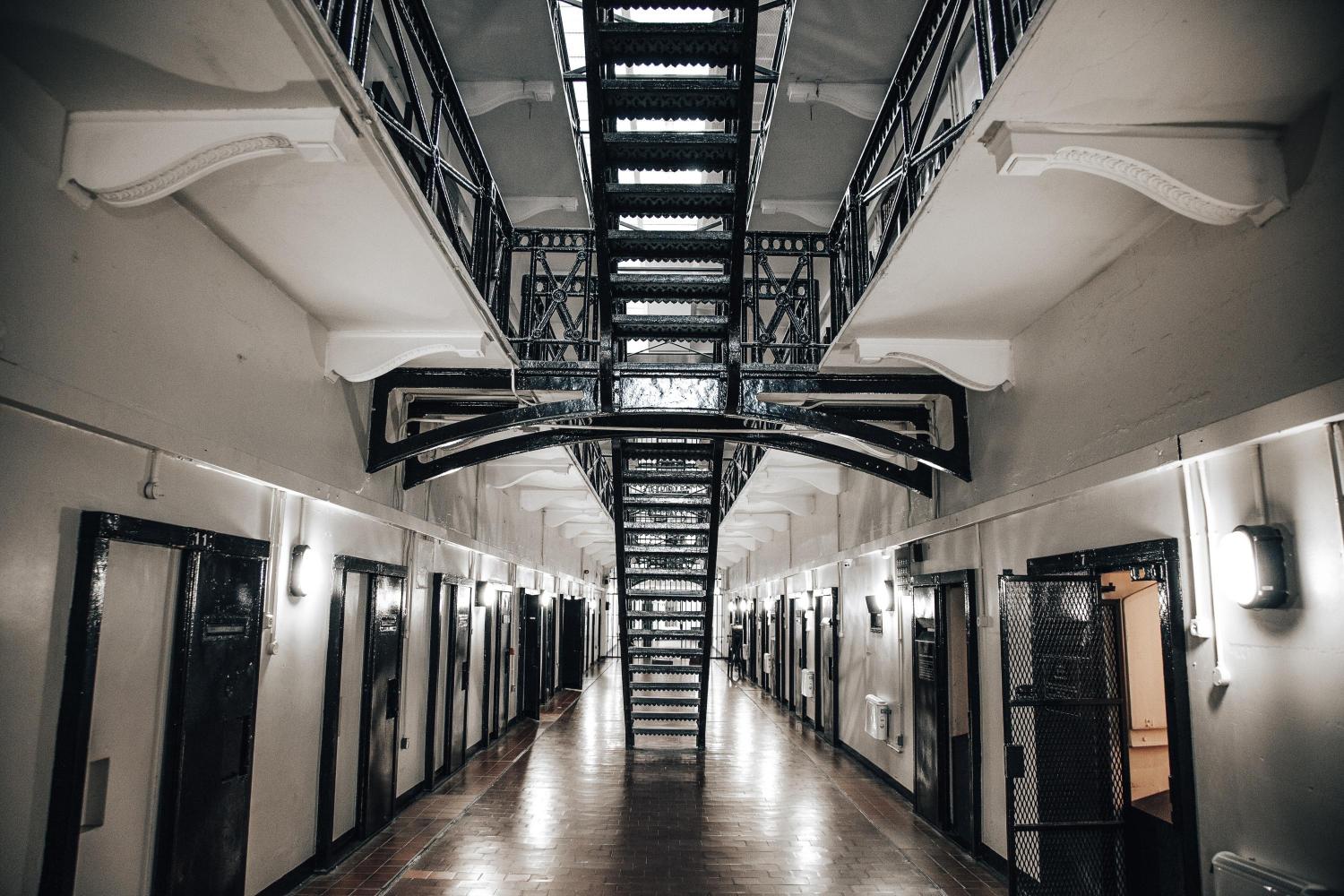
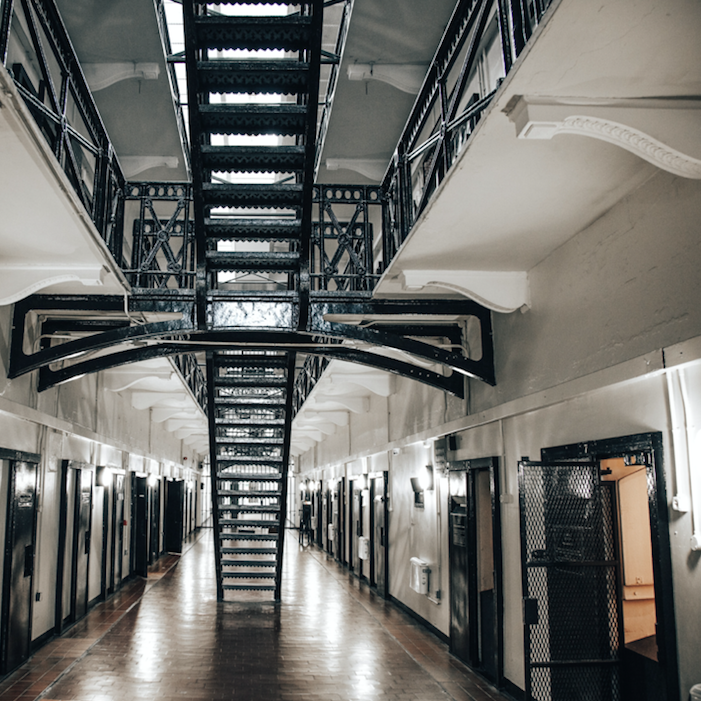
As discussed yesterday, momentum is building so that second-chance hiring can be the norm, not the rare exception, across Corporate America.
Plenty of hurdles, however, lie ahead. Despite the fact that 7 million jobs across the U.S. are still unfilled, and the fact that organizations like the Society for Human Resource Management (SHRM) offer companies the tools and guidance necessary to make second-chance hiring a more seamless process, many formerly incarcerated prisoners still struggle finding jobs that can allow them to rebuild their lives and contribute to their local communities and the U.S. economy.
Last year’s passage of the First Step Act, a federal law designed to provide for programs that can prevent recidivism after former prisoners complete their sentences, are also helping with this effort.
Nevertheless, Jenny Kim of Koch Industries insists the private sector can, and must, do more.
The business case for second-chance hiring
“Business has been the voice that's missing from this,” said Kim. “And the reality is we all live in these communities, and 97 percent of the folks in prison are coming back to our communities; we have got to figure out a way so that we can all subsist in this ecosystem successfully together.”
For Kim, her colleagues at Koch and her peers at SHRM, the reality of a nationwide talent pool that includes one in three people who have a criminal record cannot be overlooked; the alternative is continuing the same cycle of incarceration, despair and recidivism. “People's needs are very different - our demographics are very different now,” explained Kim, “and we have to figure out the way we can take a shot at breaking out of generational poverty. People want a shot to make the American dream.”
There is an indication change is afoot in the private sector, one that Kim acknowledges. “I’m inspired seeing companies like JPMorgan Chase and Bank of America talk about this. I think companies are now stepping up to the plate and are becoming leaders in their community when it comes to this challenge. We have been able to lead on this at Koch; that's the thing that we're most proud of.”
The very human case for second-chance hiring
For human resource managers or for any professionals in management who are wary of second-chance hiring, Kim was emphatic that they take a step back and again, look at these individuals as what they are – humans. Human beings, just like the writer and reader of this article, with the difference that they did that have the support and encouragement many of us have taken for granted from early childhood.
“I've been very lucky personally to have a very strong network of family, of friends, but not everyone has that,” Kim said as she reflected on her background and the focus of her work at Koch. “And so, looking at that humanity and looking at it from that aspect, I think that has been the most rewarding.”
Kim’s drive also comes from the fact that her work has had a massive impact on people she had never interacted with and will most likely never meet. But with that pride comes a deep sense of humility, evident during the long conversation she had with 3p.
“Often, you don't know whose lives are changing by the work that you do. And maybe that's the biggest blessing that so many people will be touched by this work if we all collectively do it together,” she said. “And that's the biggest transformation that all of us could contribute to - but it's okay if none of us get credit for it as well.”
If can agree on this one thing . . .
The resources Koch Industries, the Koch Foundation and yes, the Koch network have invested in this movement has attracted a bevy of supporters across the U.S. political spectrum, including CNN commentator and former Obama administration official Van Jones. “This is an authentic movement . . . the left and right have come together on this for principled reasons,” Jones told CNN’s Christiane Amanpour during a joint interview he held with Koch Industries’ senior vice president Mark Holden after the First Step Act was passed last winter.
But not everyone praises Koch Industries’ stance on this issue. As The Atlantic summarized in 2015, the company’s opponents, in the words of Molly Brown, see this campaign as “just another attempt to manipulate the political process to advance the company's financial interests.”
Jones’ response to Brown, shared in the same article, was pointed: “When you've got more than 2 million people behind bars, I'll fight alongside anybody to change those numbers."
That point of view is shared by Kim. “We are willing to work with anyone and unite with anyone to do what’s right.”
“We're at a touch point with where Americans of all demographics I meet with day to day are really concerned about where we're headed,” Kim continued, “and the criminal justice system basically has been a warehousing tool for a long time, but we can't afford to do that anymore.”
For anyone who still isn’t persuaded by Jones, or Snoop Dogg’s public appearances with Charles Koch, here’s what Kim has to say:
“If anyone criticizes Koch, well, this is the beautiful thing about the fact that we are in the United States. We can have a civil dialogue about it, or not. And this is why my parents immigrated to this country, because when they were growing up in South Korea, they were not allowed to say anything about the government or the president.”
Wherever one’s thoughts about Koch Industries may lie, there’s little doubt that the company is leading and winning on this massive challenge. And this challenge has become a movement, one that includes companies, people and governments from all walks of life: from Ben & Jerry’s to John Legend . . . to conservative governors in the reddest of the red states like Georgia and Texas.
And if you cannot get past how important this second-chance hiring movement because of your feelings about Koch or any other company working on this challenge, here’s a gentle reminder: If your friend or family member was once incarcerated and still struggles making ends meet because of his or her past, the stubborn fact is that you would feel far differently about the groundbreaking and life-changing work that Kim and her colleagues refuse to stop doing.
A reminder: Later this month, we’ll be hosting 3BL Forum: Brands Taking Stands – What's Next, October 29-30, at MGM National Harbor, just outside Washington, D.C. On the afternoon of the 29th, Jenny Kim of Koch Industries will be onstage discussing how the private sector can help support prison reform and the hiring of formerly incarcerated citizens. You won’t want to miss this!
We're pleased to offer 3p readers a 25 percent discount on attending the Forum. Please register by visiting the 3BL Forum website and use this discount code when prompted: NEWS2019BRANDS.
Image credit: Tom Blackout/Unsplash
When It Comes to Health and Well-Being, Put Consumer Safety First
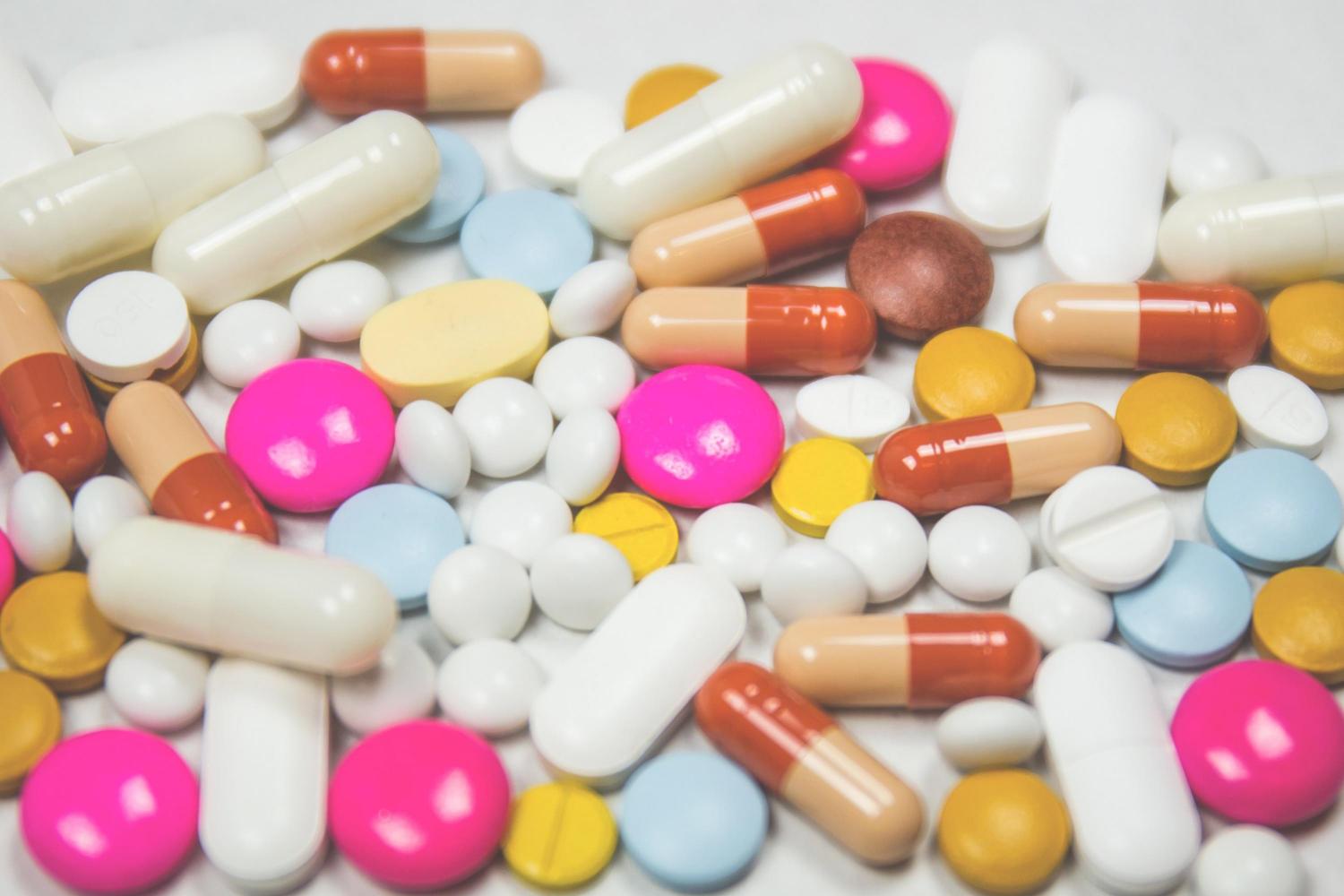
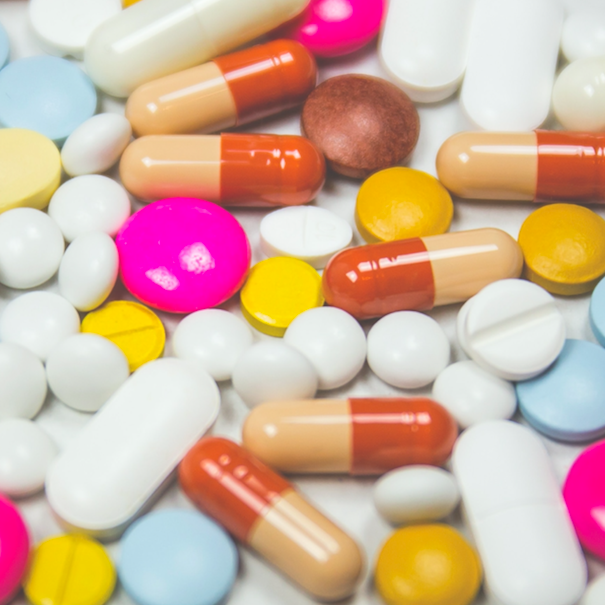
Millions of people use FSAs and HSAs to buy health and wellness products, so ensuring the quality and safety of these products is essential.
Despite widespread changes to health insurance and employee benefits in recent years, roughly half of Americans still receive health benefits through their employer, and, of those employers, 56 percent offer a company-sponsored health savings account (HAS), while 68 percent offer a general medical flexible spending account (FSA). Millions of people use these special accounts to buy health and wellness products for themselves and their loved ones, so ensuring the quality and safety of these products is essential.
Unfortunately, not all online retailers adhere to this same standard and that means people with spending accounts -- and the employers who sponsor those important benefits – may be subject to fraud, counterfeit and product diversion that puts consumer safety at risk. This is especially a concern with third-party resellers who have been known to sell counterfeit or unsafe products.
Every product available for purchase with one of these accounts is required to be an IRS-qualified product or service. Every product available on e-commerce sites that sell products eligible for HSA or FSA spending must fulfills meet those regulations; both product authenticity and safety are non-negotiable.
3 things anyone with an HSA or FSA should know about product safety and authenticity when shopping online
The following guidelines from are built on the idea that American families deserve safe, authentic products. And for account holders and companies that provide health and wellness benefits, that means understanding a few key aspects of product safety and authenticity.
- Direct-to-consumer sourcing
The direct-to-consumer model is mostly known for helping consumers save by cutting out the middleman. The Health-E Guidelines recommend shopping brands that follow best practices like ISO 9000, a certification that tests for unsafe levels of lead, cadmium and other hazardous substances, as well as a UL certification for safety in consumer electrical products. These certifications can generally be found on a company’s website.
Companies that follow these standards are more likely to have the monitoring and testing protocols in place to ensure safe products, and these tight supply chain controls are a must for health and wellness products.
- Counterfeit products
In the health and wellness industry, where counterfeit and mishandled products could put consumers in danger, being aware of and able to identify sources of potential counterfeit products can be lifesaving. In most cases, if something seems suspicious, it probably is. Look out for product images and descriptions that are incorrect, poor quality or overly generic as dead giveaways that a retailer isn’t telling the full story.
Brands and their customers can fight back against these unauthorized sellers. The U.S. Consumer Product Safety Commission (CPSC) encourages consumers to file reports of harm involving consumer products through SaferProducts.gov.
- Consumer education
Health and wellness companies and online retailers have an obligation to teach customers how to spot fake products, counterfeit merchandise, suspect product pages, and more when shopping for qualified health products. Therefore, online shoppers should look for retailers and brands that provide educational resources that help them become more savvy consumers and that protect their health and well-being.
Collaborating for consumer safety
The U.S. Government and Accountability Office (GAO) examined the issue of product authenticity and safety in a 2018 study where they purchased a variety of items of different types from third-party resellers on five popular consumer ecommerce sites. The GAO found that 20 of 47 brand-name products purchased were counterfeit. And for three of the four product types, at least one item purchased was determined to be counterfeit, according to the study.
In response to this growing threat, a coalition of companies that manufacture eligible health and wellness products, as well as organizations like the Consumer Healthcare Products Association (CHPA). Together, they have developed the Health-E Guidelines to protect individuals from diverted, unsafe health products and the rise of unauthorized third-party sellers.
Brands and retailers that educate consumers about product authenticity and safety have an opportunity to increase loyalty and sales, while demonstrating their commitment to customers. In the health and wellness industry, that should always be the non-negotiable first goal.
Image credit: Unsplash